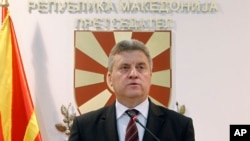The United States ambassador to Macedonia is calling for President Gjorge Ivanov to reverse his decision to withhold from the opposition a mandate to form a new government with ethnic Albanians.
Ivanov on Wednesday defied parliament, saying he would not give such authority to anyone backing what he calls "a platform undermining Macedonia's sovereignty, territorial integrity and independence."
The leader of the opposition Social Democrats, Zoran Zaev, accused the president of a coup and pushing Macedonia into a "deep crisis with unforeseeable consequences for citizens and the state."
"The United States was disappointed to learn yesterday that President Ivanov declined to offer to representatives having a clear parliamentary majority the opportunity to form a new government," U.S. Ambassador Jess L. Baily said Thursday at a news conference in Skopje.
"We believe that this was inconsistent with basic democratic principles and the rule of law, which are core values of the North Atlantic Treaty Organization [NATO]," to which the Balkan country is seeking accession, he added.
"As a strategic partner of Macedonia, as a friend, and with full respect to Macedonia’s sovereignty and unity, we urge President Ivanov to reconsider this decision. At the same time, we urge Macedonia’s neighbors to exercise restraint and be constructive at this moment of heightened political sensitivity in the country," Baily said.
His comments came less than a day after European Enlargement Commissioner Johannes Hahn began pressuring Ivanov on social media, Tweeting: "In a #democracy, one must acknowledge #parliamentary #majorities, even if one doesn't like them."
Macedonia has been a candidate for accession to the European Union since 2005.
In December, Ivanov's conservatives won two more seats than the opposition, although neither party won enough seats to form a government on its own. The conservatives failed to put together a coalition while the Social Democrats succeeded with ethnic-Albanians by promising to expand the use of Albanian as an official language.
Ivanov is refusing to give Zaev a mandate to form a government despite a majority in parliament signing a letter backing a new coalition.
The pledge to expand the Albanian language triggered protests in the streets of Skopje that drew thousands.
Macedonia has been in a political limbo for two years since a surveillance scandal broke and eventually forced veteran VMRO-DPMNE leader Nikola Gruevski to resign a year ago.
Relations between Macedonians and the ethnic-Albanian minority have always been tense and had threatened to become civil war in 2001 when ethnic-Albanian militants began attacking Macedonian forces.
This report was produced in collaboration with VOA's Albanian Service.





